- Home
- Joel Rosenberg
The Silver Stone Page 2
The Silver Stone Read online
Page 2
He turned to see a tan Ford LTD, the rack of flashers on its roof the only markings. That was enough.
“Hey, neighbor,” a familiar voice said, as a broad face peered out the open window. “You need a ride?” Under a bristly mustache, Jeff Bjerke smiled broadly as he pulled off his sunglasses for just a moment, polishing them with a blue bandanna before replacing them on his face.
“Thanks, Jeff.” Ian opened the rear door and slid his package onto the rear seat, then climbed in front with Jeff Bjerke, accepting a firm handshake in the process. Jeff was a head shorter than Ian’s six feet, and even more so in the legs; Ian’s legs were scrunched up uncomfortably.
Jeff was only four, maybe five, years older than Ian, but the air of authority that his pistol belt and khaki cop shirt gave him made him seem older, despite the incongruity of the jeans and sneakers. Ian wasn’t used to policemen in jeans and sneakers, and there was something strange about the gun in Jeff’s holster. It seemed smaller than a cop’s gun should.
He didn’t ask. He just knew that Jeff would say something about size not being important, but what you did with it, and Ian didn’t really need to hear that. He was all too often the straight man around here.
“Where to? And what are you doing out walking?” Jeff frowned. “Car break down? I’ve been on this road since Thompson, and I haven’t seen any stopped cars.”
“Nah.” Ian shook his head. “It’s not that; I didn’t come by car. I got dropped off at Har—at the airstrip. Left my bags there; figured I’d walk into town and borrow a car from Torrie or Arnie.”
“You actually left your bags without anybody standing over them, did you?” Jeff grinned broadly.
“Hey, Arnie and the Thorsens are turning you into a regular small-town guy, eh?” He threw the car into a quick three-point turn and headed back toward the turnoff, and the airstrip.
“Well, yeah,” Ian said.
“Well, good,” Jeff said. “Let’s grab your stuff, and then we’ll have you at Arnie’s quicker’n grain through a goose.”
“Can’t beat that.” Ian returned his smile. “How quickly does grain go through a goose, anyways?”
“Wouldn’t know.” Jeff shrugged. “I keep the peace, not the geese.”
Ian dropped his bags on the porch of the small bungalow and waved goodbye to Jeff, who drove off slowly, the way people drove around town. It was one thing to speed down the country road, Arnie had explained to him, but in town you never knew when a ball was going to roll out onto a street with a pack of kids in hot pursuit.
Besides, so what if it took four minutes instead of two to get clear across town?
It was a quiet afternoon. Kids were still in school, although undoubtedly several packs of less-than-school-age children were prowling the streets and backyards of Hardwood, looking for some sort of minor trouble to get into, supervised only occasionally by the same sort of face that was right now peering out the front window across the street at Ian.
Ian waved a hello to Ingrid Orjasaeter, who returned his wave with a smile before vanishing into the relative darkness of her living room.
Ian knocked on the door twice, then twice again before turning the knob and letting himself in. No key was necessary, which was just as well; Arnie didn’t have the slightest idea where the keys were, and that mean that Ian didn’t, either.
“Hello, the house,” he called out as he rubbed his feet on the welcome mat and dropped his bags to the floor. He let the screen door shut behind him, but left the front door open as he walked into the living room.
A vague musty smell hung in the still air, although the living room was neat and clean, no trace of dust allowed on the shelves of little knickknacks that Arnie’s late wife had collected over the years. On one shelf, little porcelain cows and silver bells and little cut glass figurines surrounded an ordinary shot glass that Ian had meant to ask Arnie about, but never quite had remembered.
The overstuffed chairs and couch had probably been new fifty years before, and restuffed and slipcovered a half dozen times since then. They were comfortable, though, and that was nice. They were Ephie’s, and that was important to Arnie.
“Yo? Arnie? Anybody home?”
He shrugged and walked into the small, tidy kitchen and pulled on the swing-out handle of the ancient Kelvinator refrigerator. It was three-quarters empty: a covered pot of something or other—probably soup or stew, almost certainly quite edible; Arnie was a not-bad cook—half a loaf of Master English Muffin Toasting Bread, half a bottle of dubiously dark Heinz ketchup, and half a six-pack of Cokes. Glass bottles, not cans. Arnie didn’t like cans.
Ian twisted open a Coke, pitched the bottlecap into the garbage while he took a long swallow, then brought it with him, down the hall and past Arnie’s bedroom on the left, to what had been Ephie’s sewing room, and was now Ian’s bedroom, on the right.
He opened the door and turned on the light.
The poster advertising the new Andrew Vachss book had fallen, again. The bed was stripped down to its striped mattress. Clothes lay scattered on the floor, a large heap of clean clothes near the foot of the bed, a smaller heap of dirty laundry over by the bookcase. An irregular heap of books covered the floor near the head of the bed, testimony to Ian’s need to read himself to sleep.
It looked pretty awful, but it was just the way he had left it.
He forced himself to smile. Starting when he was four or five, every time he dared to leave his room messy, his father counted how many items were out of place, and hit him once for each item. Of course, at four or five, a kid doesn’t have the idea of order, not yet; Ian could never get it right, and could never avoid his father’s hard hand.
What would this add up to, Dad? A hundred things out of place? Two hundred? A goddamn million?
“Fuck you, Dad,” he said, quietly.
Ian rehung the poster, pushing hard against the beads of gunk at the top, then gave a quick thumbs-up to Andrew Vachss’s ungrinning face.
“Later, Andy,” he said, slinging his canvas bag across his shoulders.
He drained the Coke and tossed it into the garbage can just outside the back door.
The street—it undoubtedly had a name on some map somewhere, but nobody ever used street names or numbers in Hardwood—ended in a T, rimmed by woods on all sides.
A short path through the woods broke on the yard of the Thorsen house. Two-storied, plus an attic that seemed to sprout dormers like a potato sprouted eyes, topped by a sharply peaked roof, the front cupped by a screened, U-shaped porch that stretched across the whole front and part of two sides; behind it, a red barn; in front of it, three cars parked on the grass next to Karin Thorsen’s red Volvo, plus the shiny black Studebaker on blocks that it appeared Hosea had made some progress on restoring to service.
It still needed wheels, but Ian didn’t figure Hosea would have finished the body until he had brought the engine back to life; the old guy believed in first things first.
Ian hadn’t been in Hardwood long enough to recognize everybody by their cars the way the locals could—hell, Arnie claimed he could tell whether Karin or Thorian Thorsen had been driving their big blue Bronco from the way it was parked. Still, there was no mistaking the big maroon Chevy Suburban that Doc Sherve used as his traveling office—and, rarely, a makeshift ambulance—as well as his personal car.
Why would Doc be here? He could be just visiting—visiting seemed to be the major recreational activity in Hardwood—but during the workday?
Karin had asked him to come home early, and hadn’t explained why.
Ian quickened his pace to a trot.
Chapter Two
The Best—Laid Plans
Arnie Selmo was just warming to the argument when the kid rounded the building. These days, these quiet days, these too many long days without Ephie, arguing was one of the few joys he had left.
“The Garand,” he had said, stretching out a hand for the bottle of Leinenkugel on the grass next to his chair, “was the best da
mn rifle the army ever had. Went to shit when they decided to trade it in on that those leetle twenty-twos.” He took a sip from the bottle.
Doc Sherve chuckled, while Davy Hansen’s natural glare darkened. Over by sliding glass doors that were open to their sliding screens, old Hosea Lincoln turned his attention from the file and piece of metal in his lap to flash a quick grin, his teeth ivory white in a face the color of coffee barely lightened by milk, not cream.
Davy grunted as he sat back in the chair, huddling into the olive drab army jacket that, shabby as it was, couldn’t have been brought back from Vietnam. “I’ve carried a Garand. Heavy. Not the sort of thing I’d want to hump for twenty, thirty klicks a day, but have it your way.”
“I’ll be happy to go walking with—with my Garand any old time,” Arnie said, cursing himself for an asshole. That sounded awkward, and stupid; Arnie hid his embarrassment with another pull at his beer.
Sure, he could walk Davy into the ground. Damn near anybody could walk Davy into the ground. From just below the knee, Davy’s right leg had been blown off in some muddy field in Vietnam, and while Davy wasn’t one to complain, it was dear that plastic leg they fitted him with hurt him when he walked too far on it.
Arnie hadn’t meant any harm, but shit that had been a stupid thing to say.
It was just that that had always been Arnie’s one talent, walking. He had grown up on a farm a good six miles out of town, and it had felt like he had spent most of the Depression walking either to school or home from school, save only for those days that the Selmos were snowed in.
Even back in basic, closer to half a century ago than Arnie liked to remember, he would finish the thirty-mile hikes ready for more—although he would do his best to hide it; the second thing he learned in basic was to keep with the crowd, keep his head down.
And it hadn’t left him, even with age.
Which had made it kind of funny, actually, when somebody as good at walking as Arnie had been was assigned to the cavalry—Dog Troop, 7th Regiment, First Cavalry. Well, it hadn’t seemed so funny when they’d shipped out to Korea; they’d fought their way up and down that fucking peninsula as infantry, and while it was one thing to walk up and down the hills of Georgia, a Korean winter was something else entirely. Meaner than a North Dakota winter, somehow.
Maybe that had been because of the assholes who had been shooting at him.
Davy shrugged it off. “I’d just as soon carry any other twelve pounds of dead weight,” he said, while Doc pursed his lips and shook his head.
Now, while Arnie had long since learned that you couldn’t judge somebody by their looks, Doc looked like a country doctor, from the stethoscope sticking out of the pocket of the white doctor’s coat now draped over the back of his chair to the small black doctor’s bag that never was more than a few feet away from him, to the close-trimmed beard, now more gray than salt-and-pepper.
Doc took another bite of coffee cake, and washed it down with a sip from his mug. “Me,” he said, “I try not to know anything about guns. ‘Course, every year or so during hunting season, I learn about how somebody can shoot his foot off with one that he would have sworn was unloaded. Pretty dangerous, those unloaded guns.“
“Well, at least I got a better excuse than that.” Davy grinned and tapped on his own artificial leg. “You gonna come deer hunting with us this year, Doc?” he asked.
Doc bit on his lower lip, as though considering it, as though he hadn’t been invited along half a million times. “Nah,” he said, finally, the way he always did, “I never kill anything… on purpose.” He raised a hand to forestall the usual argument. “Now, I’m not criticizing, mind, and I won’t be one to turn down a venison steak or chop, should somebody find himself with some extra, but I don’t fix my own car, and I don’t kill my own food. I don’t look down my nose at those who do, but I just don’t. And as far as I am concerned—” He looked up. “And welcome back, Mr. Silverstein,” Doc said, rising to his feet as Ian Silverstein rounded the side of the house at a quick jog. “What’s the rush?”
The boy looked good for his vacation, Arnie decided. A light tan had taken some of that pasty, city-boy look from his face, and he had let his beard grow for the past month or so, which was all to the good. Ephie would have thought him too skinny, and tried to put some meat on his bony frame, but the kid was built along greyhound lines, not bull-necked and solid like a proper Norski-American.
Which was fine by Arnie; the world was big enough for all kinds of folks.
Ian eased a canvas bundle from his shoulders and lowered it to the ground as he accepted Doc’s hand.
“Some sort of problem?” he asked. “I saw your car, and I hurried.”
Arnie grinned. The kid was quickly turning into a real small-town type in what? Six months or so? Give him another few years and he might not wake up screaming in the middle of the night.
“Nah.” Doc plopped himself back down in his chair. “Only problem is that I just finished my house calls, for the day, and I’m taking the rest of the afternoon off, unless Martha and Katie run into something they can’t handle, in which case they can either beep me,” he said, patting at the pager he used as an oversized tie clip, “or call me on the bag-o-phone.” He jerked a thumb at his doctor bag. “So instead of seeing what stale McGlynn’s delicacies are waiting boxed at the Dine-a-mite, I decided to stop by and beg a piece of Karin’s coffee cake and a cup of her coffee …”
“To which you are welcome, as always, Bob,” Karin Thorsen said, emerging from the dark of the house, a tray balanced on the palm of her hand. Her eyes grew wide as she saw Ian, and she quickly set the tray down on the table and ran to him, giving him a quick hug and a peck on the cheek.
Something—her closeness, maybe?—seemed to bother the kid, and he tried to cover it by picking up the tray and setting it down next to Doc Sherve.
Better to do something than just to stand there looking like he didn’t know what to do.
“Thank you. And welcome home, stranger,” she said. “How was St. Kitts?”
“I had a good time. Quiet, but good.” Ian stretched and smiled. “I spent most of the past month lying on a beach, halfway around the island from Basseterre, when I wasn’t eating or sleeping.”
“No fencing? Not a bit?”
He grinned. “Well, just a little. And I did a bit of snorkeling, but mainly I got some rest.” He winced slightly, and his thumb touched his gut, just over his liver.
“Eh? What’s this?” Doc frowned. “Indigestion? Or should I crank up for a quick appendectomy?”
“Neither.” Ian shook his head. “Just an old wound, mainly healed up.”
“I’ll get you coffee,” she said, turning away. “Black, as I recall.”
Arnie suppressed a grin as he noticed the way Ian watched the tightness of Karin’s jeans as she disappeared back into the house, but the boy caught him at it. Ian’s cheeks burned red.
No harm done. Karin Roelke—shit, after twenty years of her being married Arnie still thought of her by her maiden name—looked a lot younger than her forty years, and it wasn’t just Arnie getting old. The long legs in their tight jeans and the firm breasts pushing against the blue workshirt that was cut tight to emphasize her slim waist were enough to give even an old man ideas, and Ian was still a young buck, all full of piss and hormones.
‘Course, the boy knew better than to make a pass at his friend Torrie’s mom, and shit, if she didn’t want to be looked at, she wouldn’t dress that way. Nothing wrong with a young girl dressing to show that she was, well, built.
And hell, boy, when did you start thinking of a forty-year-old woman as a young girl?
Arnie caught Hosea’s eye, and returned his broad grin. No harm done, eh?
Hosea Lincoln—well, that was what he called himself—gave a genial nod and smile before turning back to the piece of metal he was working on, taking another few rasps with a file before holding it up and examining it in the bright sunlight. Even sitting, he still look
ed tall and skinny, and the plaid shirt and faded, neatly patched Levi’s overalls looked more like a costume than natural clothes on his long form.
His right hand gripped the metal firmly, if a bit awkwardly; it was his left hand that did all the fine work. “It’s good to see you back, Ian Silverstone,” he said, his voice slightly slurred, as though he had been drinking, although he hadn’t.
“Silverstein,” Arnie said, correcting.
Ian dismissed it with a shrug. “I don’t mind. I’ve been called that,” he said, and dropped a quick phrase in a language that had the lilt of Norski, but that Arnie couldn’t even begin to follow.
Hosea answered in the same language, it sounded like. “I thought you were due to return in a matter of some days,” he went on in English. “I trust you had a pleasant vacation?”
Ian nodded. “Just fine.”
“And your injury is better?” Hosea asked, his brow furrowing.
“Well, as I always say, there’s no rest for the weary.” Doc grunted and set his coffee cup down and stood, pulling a packet out of his jacket pocket. “Okay, okay, off with the shirt, and let’s see this injury,” he said, tearing open the packet and pulling out a damp towelette-thingy, wiping his hands with it and then dropping the used towelette and its wrapping into a side pocket. He rubbed his hands together to dry them, and looked like Scrooge gloating over his money for a moment.
Ian shook his head. “It’s just fine, Doctor Sherve, really it is.”
“Yeah, right, and if I remember right, you’re something like one year of college, four years of med school, and three years of residency shy of practicing medicine, so off with the shirt and pull up a seat,” Doc said, pointing to the weather-beaten wooden chair next to him.
Davy chuckled. “Be glad you didn’t tell him you have hemorrhoids, boy, or you’d be crouching on your hands and knees with your ass up in the air.”
“Davy Larsen, shut up. Ian Silverstein, take off your shirt and sit down.” Doc had been ordering people around over four decades that Arnie knew about, and probably more than that. Hell, he’d probably been bossy from the cradle on.

 The Road Home
The Road Home The Sword and the Chain
The Sword and the Chain Not Quite Scaramouche
Not Quite Scaramouche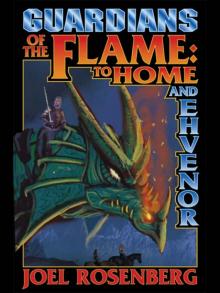 Guardians of The Flame: To Home And Ehvenor (The Guardians of the Flame #06-07)
Guardians of The Flame: To Home And Ehvenor (The Guardians of the Flame #06-07)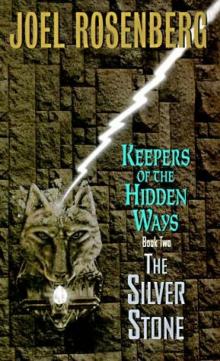 The Silver Stone
The Silver Stone Hero
Hero Not For Glory
Not For Glory The Sleeping Dragon
The Sleeping Dragon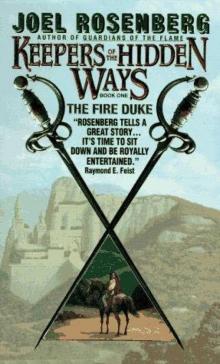 The Fire Duke
The Fire Duke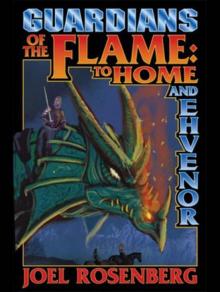 Guardians of The Flame: To Home And Ehvenor (Guardians of the Flame #06-07)
Guardians of The Flame: To Home And Ehvenor (Guardians of the Flame #06-07)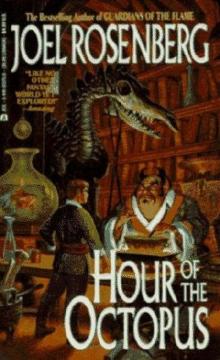 Hour of the Octopus
Hour of the Octopus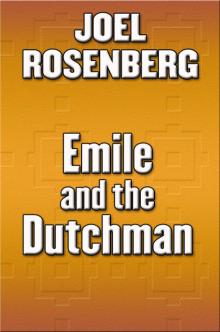 Emile and the Dutchman
Emile and the Dutchman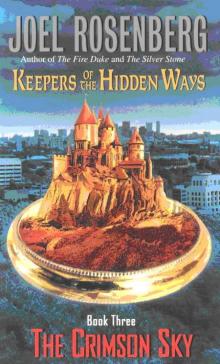 The Crimson Sky
The Crimson Sky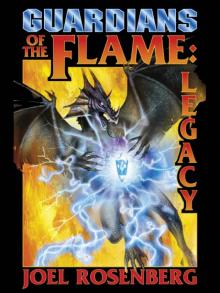 Guardians of the Flame - Legacy
Guardians of the Flame - Legacy The Silver Crown
The Silver Crown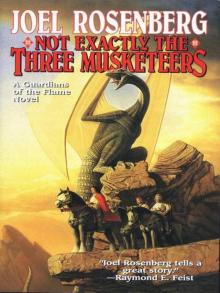 Not Exactly The Three Musketeers
Not Exactly The Three Musketeers Not Really the Prisoner of Zenda
Not Really the Prisoner of Zenda